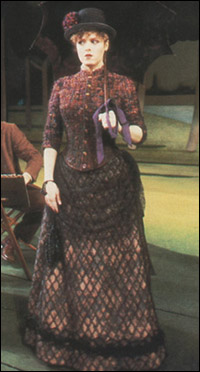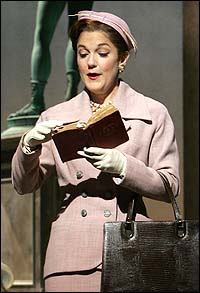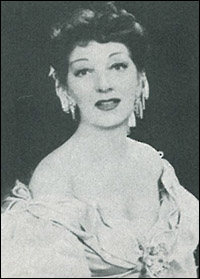
Judy Kuhn
Actress and singer Judy Kuhn, she of the exquisite voice and three Tony nominations, is on a roll: The gifted performer was seen last season as the ill-fated Fosca in the critically acclaimed, much-extended Classic Stage Company production of Stephen Sondheim and James Lapine's Passion. Now, Kuhn can be seen in the critically acclaimed, much-extended Public Theater production of Fun Home, the world-premiere musical based on the graphic memoir by Alison Bechdel. The Jeanine Tesori-Lisa Kron work, which dramatizes lesbian cartoonist Bechdel's coming-of-age and her relationship with her closeted gay father, casts the star of Chess, Les Miserables, Rags and She Loves Me as Alison's mother, Helen Bechdel.
"I’ve had the best experience working on this piece," Kuhn told me during the musical's preview period. "I play Helen, who is Alison’s mother, and in the show Alison is played by three actresses, one when she’s nine, one at 19, and one the adult Alison, who is trying to find a way to tell her father’s story. We are all her memories of her childhood and her growing up at this moment in her life, and the year that she was 19, when everything happened that changed her life. It goes back and forth in time, and I, as Helen, only relate to small Alison, as she’s known, and medium Alison. But I love her. She’s just a really complicated [character, who] lived this very difficult life in this house [and] very much tries to maintain the kind of mythology of the family, and hold the family together until, basically, she can’t anymore."
About librettist Kron, who is making her debut as a lyricist with the Sam Gold-directed production, Kuhn said, "Her writing, I think, is extraordinary in this. It’s not an easy book to adapt, to figure out what the theatrical version of this graphic novel is because a graphic novel is obviously very visual. They decided that they couldn’t put the book on stage; they had to find the theatrical equivalent of these panels, of these snapshots of Alison’s life, how the adult Alison would tell her story in a theatrical form. And, I think they really found it.
"I always knew Lisa was a great writer, but what people will learn from this is that she’s an amazing lyricist," Kuhn added. "I mean, her lyrics are great, truly great lyrics. The way the music and the book are woven together is so seamless. And, Jeanine’s music is amazing, and Sam Gold’s direction is amazing. This team collaborated in a way I’ve never seen a team collaborate. I think Jeanine said the other day, 'We really worked as one,' and I think that it shows in what you see onstage."
Diva Talk also asked the Broadway favorite to select her dream stage roles in musical and/or nonmusical productions. Kuhn said it was an interesting challenge "for so many reasons, partly because I feel like I'm back on the boards a little bit, and yet I'm a different person and I'm re-aligning my thoughts about the kind of roles I should play." Click through to see the roles Kuhn chose and her thoughts about each part.
 |
||
| Bernadette Peters in Sunday in the Park with George |
||
| Photo by Martha Swope |
There are roles I've always wanted to play, but I think now, "Hmmm, maybe that ship has sailed." [Laughs.] I also tend to think more about the writers that I want to do — [Stephen] Sondheim always. I’ve always wanted to play Dot in Sunday in the Park. Now, that's a ship that has probably sailed, but if someone would let me sing that score, I'd die happy. Desiree Armfeldt in A Little Night Music
In getting ready for this interview, I've been writing down ideas about things I want to do. And, I realized there's a theme of women who are where I am in life, a point in life where you really examine your relationships and … what you thought your life would be like and what it turned out to be. And, [Desiree] is at that particular moment when she’s looking back on what she’s given up and what she wants. A certain part of her life is gone, and so she’s looking at how she can have the thing she’s missed, which is love, really. And, of course, there’s the music. I just think Night Music is a beautiful piece.
I haven't [ever performed "Send in the Clowns"], and there’s such a challenge there because it’s the Sondheim song that even if people don’t know who Sondheim is, they know that song. To take on something that you can find a way to own and make it new again – I love those sort of challenges.
Sally Durant Plummer in Follies
Again, it’s sort of a similar thing, of someone who is trying to understand where her life has come… It's funny because both Desiree and Sally have been performers and they have come to a certain point in their life – like, in my own life, I’m no longer the ingénue, so who am I now? [Desiree asks], "What did I give up to be a performer?" [For Sally, it's], "What did I give up by not being a performer?" She took another road — and looking at what that means, and, of course, looking at her marriage. It's interesting, too, because I’m also seeing this through the lens of the play I’m doing right now, which is also about a marriage: A woman who has a myth about her marriage and then realizes, "This is actually not the truth," and you have to face the truth about your life and your central relationship. I’m just really interested in that right now.
 |
||
| Victoria Clark in The Light in the Piazza |
||
| Photo by Joan Marcus |
Again, a woman who’s looking at her life through a different lens all of a sudden because of what her daughter is experiencing. She has to confront this lonely marriage she’s in and how to let her child go. … I’m also a mother in the process of letting my daughter go, now in college. As a parent, you’re so fiercely protective of your child, and then there’s a point you realize there’s only so much you can protect them from and they have to make their own choices, and you have to let them go… I’ve sung some of Adam [Guettel]'s songs, but I’d love to be in one of his shows. I just love his writing so much. I think he’s an extraordinary voice.
 |
||
| Gertrude Lawrence in Lady in the Dark |
||
| Photo by Vandamm Studio |
Kurt Weill is another one I feel such an affinity for, his music and also subject matter. …Lady In The Dark — I think it’s a hard thing to do, but I think it’s fascinating. It’s a play about psychoanalysis that was written in 1941! … Stylistically, his music changed depending on his collaborator, which I find fascinating, but I also think he tended to work with writers who kind of broke open the form of musical theatre. I think their stuff was so ahead of its time, and that piece is one example of it. Again, an exploration of a woman’s role in marriage and society. Just the whole idea of a musical about psychoanalysis. There’s all this fantasy…and the dream thing...I just think it’s a fascinating piece, and it’d be an amazing part to play… I think he was just so far ahead of his time. And, of course, one of his most beautiful songs is in it, “My Ship.” And that is used in such an interesting way because you hear fragments of it, but you can’t sing the song until she’s come to an understanding of herself through the analysis. Susan Cooper in Love Life
And then the other [Kurt Weill] I’ve been fascinated with for a really long time is Love Life, which is again about marriage and a completely avant-garde piece of writing. It was about this couple, and it starts in the Revolutionary War era and goes to the mid-twentieth century, contemporary time when it was written. It goes through all these different eras. The couple and their two children never age, but their lives are different because of the cultural backdrop. So it’s really an exploration of marriage and family life in different eras. I feel like that also has so much resonance for right now when we’re all talking about family values and different kinds of families and what does it mean...I find that piece really fascinating, and it also happens to have a great score.
 |
||
| Gertrude Lawrence in The King and I |
I would love to play Anna in The King and I, and that’s also a role that I feel I’m right for now. Of all Rodgers and Hammerstein, I just feel an affinity for that piece. She’s a great character, and it also just feels like something that is resonant for now because it’s all about cultural difference and understanding.
 |
||
| Kuhn in Fun Home. |
||
| Photo by Joan Marcus |
And then on the non-musical front, I would love to do more Chekhov. I had the opportunity to do Three Sisters a few years back. The part I’ve always wanted to play, again I think that ship has sailed, is Sonya in Uncle Vanya. I think it’s my favorite Chekhov, and I just love that play so much. There's something about her life and situation that I’ve always found so moving. I mean, Chekhov you can endlessly explore. Nora Helmer in A Doll's House
Ibsen — I would love to do A Doll’s House, another piece about a marriage and a woman’s role in society, and which ways women and men, too, are trapped by their roles and expectations.
"Ultimately, it’s hard to say what you want to play because you don't know what’s coming," Kuhn explained. "I would’ve never known that I would want to play Helen in Fun Home because two years ago I didn’t know it existed. Ultimately, the role you want to play is the role that’s written for you. I wouldn’t say Helen was written for me, but I’d say it was written on me. Especially when you’re working with such great writers, that is extremely satisfying and gratifying… Maybe I’m being presumptuous, but when you feel like you’ve influenced the writing in some way, that’s I guess, ultimately, the dream."
[For further information phone (212) 967-7555, or visit PublicTheater. The Public Theater is located at 425 Lafayette Street in Manhattan.]
Well, that's all for now. Happy diva-watching! E-mail questions or comments to [email protected].










